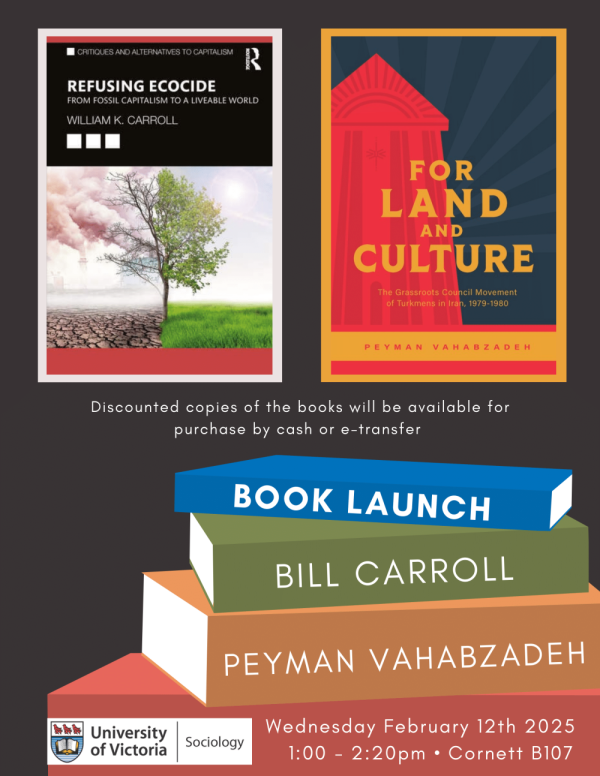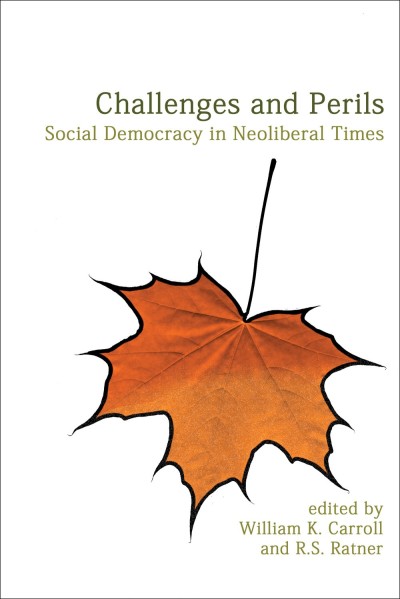Join authors Bill Carroll and Peyman Vahabzadeh in conversation about their new books Refusing Ecocide: From Fossil Capitalism to a Livable World and For Land and Culture: The Grassroots Council Movements of the Turkmens in Iran, 1979 to 1980.
About the Authors:
Peyman Vahabzadeh is a professor of sociology at the University of Victoria. He is the author of several books, including The Art of Defiance: Dissident Culture and Militant Resistance in 1970s Iran; Violence and Nonviolence: Conceptual Excursions into Phantom Opposites; and A Rebel’s Journey: Mostafa Sho‘aiyan and Revolutionary Theory in Iran. He is also editor of Iran’s Struggles for Social Justice: Economics, Agency, Justice, Activism and co-editor, with Samir Gandesha, of Crossing Borders: Essays in Honour of Ian Angus. He has published nine books of poetry, fiction, literary criticism and memoir in Persian and his works have appeared in English, Persian, German, Kurdish, French and Spanish.
William K. Carroll is Professor of Sociology at the University of Victoria, where he participates in the Interdisciplinary Graduate Program in Cultural, Social and Political Thought. He is also a research associate at the Canadian Centre for Policy Alternatives and an associate editor of Socialist Studies. His current research includes a study of networks of corporate power, globally and in “Canada”, a study of anti-corporate globalization protests at the Summit of the Americas (Quebec, 2001) and a theoretical text on social movements. Dr. Carroll participates in the interdisciplinary graduate program in Cultural, Social and Political Thought and also has an active interest in emancipatory methods of social inquiry.
About the Books:
Refusing Ecocide: From Fossil Capitalism to a Liveable World provides a critical analysis of the central role of fossil capitalism in causing climate change and argues that only alternatives based upon democratic eco-socialism can prevent the deepening of the climate crisis.
Employing three core concepts within historical materialism – capitalist accumulation, imperialism and hegemony – it locates the existential threat of our changing climate in the drive for increasing profit and growth, the domination of advanced capitalist states that strip resources and exploit cheap labour, and the consent to the capitalist way of life in the global North. With attention to the ways in which, powered by fossil fuels, capital has subjected the world to its predatory logic, this book charts this history and surveys the damage from the Industrial Revolution to today’s deep civilizational crisis, arguing that the market-based and purely technological solutions of ‘climate capitalism’ are too little, too late.
A call for a multifaceted and multi-scalar shift away from capitalist accumulation, imperialism and class hegemony and instead towards democratic eco-socialism, it will appeal to scholars across the social sciences with interests in political and social theory, the environment and sustainability.
For Land and Culture offers the first comprehensive account of a long forgotten and neglected grassroots movement. In the wake of Iran’s 1979 revolution, Turkmen peasants collectively occupied their ancestral lands, which had been seized through colonial modernization, land registry and land reform under the Pahlavi monarchy. The book chronicles this movement using theoretical and historical engagement with the modern councils and offers a detailed account of the “land question” in Iran’s colonial modernization. The book describes the systematic dispossession of Turkmen communities from some of the most fertile areas in Iran. Vahabzadeh shows how Turkmen land occupation in 1979 led to a sophisticated council system that offered a practical politics of semi-autonomous, democratic self-governance in the face of hostile militias and other forces of the nascent authoritarian Islamic Republic. With social justice as one of its unshakable pillars, the Turkmen council movement took back land as commons and abolished capitalist private ownership of land, providing an alternative to top-down politics until it was defeated by the state through a combination of military terror and assimilation. Although short lived, the radically democratic movement connected with global struggles of Indigenous Peoples and autonomous movements that had broken away from patriarchal state forms and capitalist domination.





